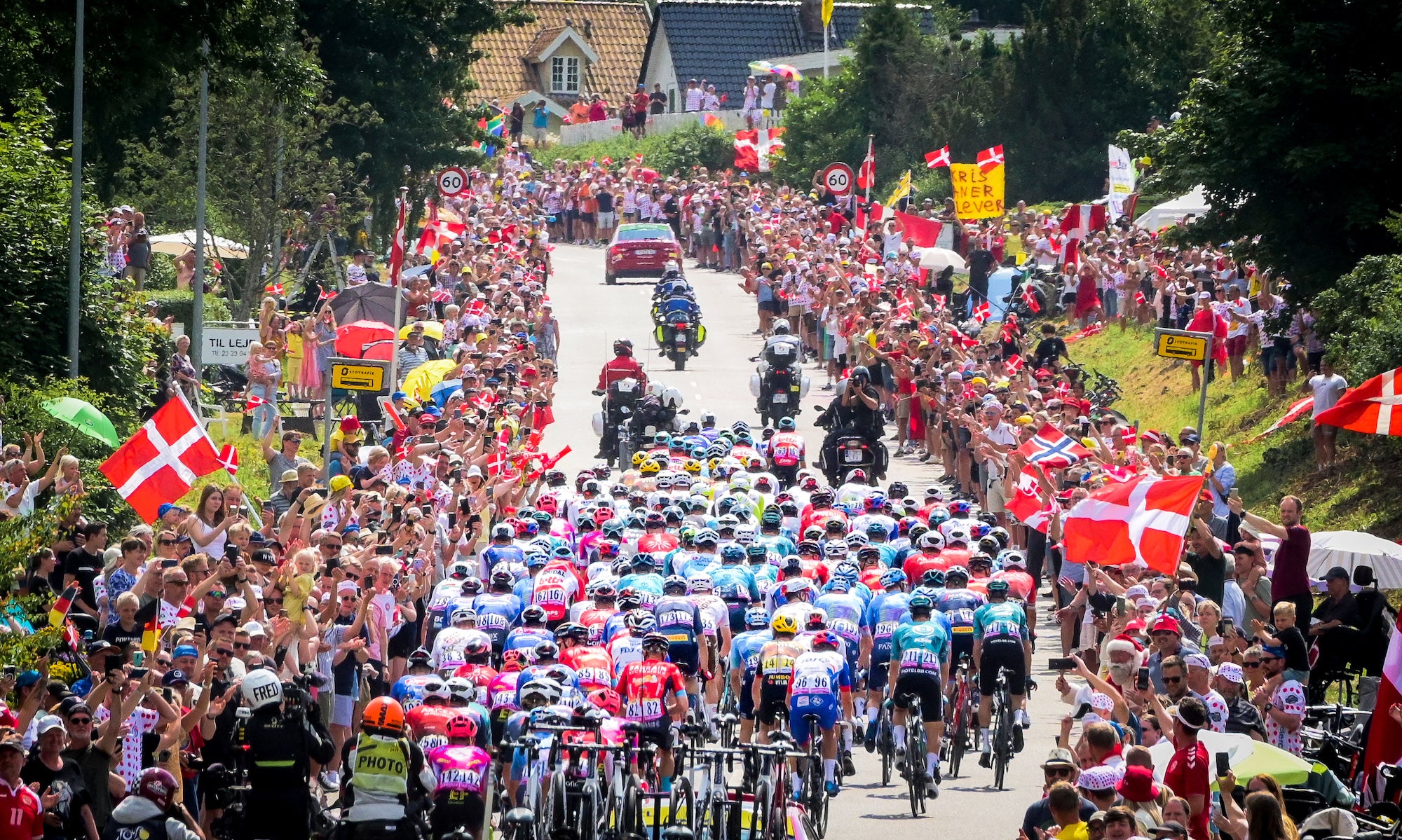Magnus Cort: alone, among thousands
Magnus Cort spent his second consecutive day off the front of the Tour de France, and it turned into a communion between Danish fans and a Danish cyclist
The metaphysical poet John Donne wrote in the 17th Meditation of Devotions upon Emergent Occasions, that no man is an island. They are words upon which EF Education-EasyPost rider Magnus Cort, during the three hours, six minutes and 58 seconds of his 130km solo break on stage three of the 2022 Tour de France, would have had ample time to reflect. Metaphysics is the philosophical investigation of the mind/body split, and fundamental principles of reality: space, time and consciousness. Cort might have asked, in the absence of any company from the peloton during his break, whether a lone rider is still actually alone when surrounded by hundreds and hundreds of thousands of compatriots all cheering their name. No rider at the Tour de France is an island, John Donne might have also concluded, especially in Denmark.
Cort was carried from Vejle, in central Jutland, to Sonderbørg on the southern island of Als, just north of the German border (or at least until he was caught), on an ecstatic, spectacular and celebratory wave of home support. The Danes have embraced the Tour de France, turning out in huge numbers on all three stages and providing the most memorable and colourful of backdrops to the race’s opening weekend. The only comparison in the race’s modern history is the grand départ of 2014 in Yorkshire, but in one way the atmosphere of stage three surpassed even that year: in 2014 there were no home riders in the breaks; today was a communion between Danish fans and a Danish rider the like of which few other riders ever will have an opportunity to experience.
Als was the third island of the Tour’s trip to Denmark (Jutland is part of mainland Europe) after Zealand and Funen. Cort himself comes from Bornholm, another island that measures about 40 by 30 kilometres, so far east of the rest of Denmark that Sweden sits between it and Copenhagen, and if you travel due south across the Baltic Sea, you end up in Poland. It’s home to a huge ruined medieval fortress and was the location for an artists’ colony - the Bornholm School - in the early 20th century. The Bornholm School painted landscapes with treatment of space that was reminiscent of Paul Cézanne, though with more subdued muted colours diametrically opposed to the bright pop art of Cort’s EF Education-EasyPost kit and bike. Cort left Bornholm at 16 to go to a sports school to pursue cycling and was seen by the coaching staff of the Danish Cycling Federation as a generational talent, one of the first of a new talent development programme. He won the Junior Peace Race in 2011, the first Dane ever to do so. The head coach, Anders Lund, once told Procycling magazine that when Cort turned pro, they nervously watched his progress: if he could make it, it would vindicate their methods and plan. He won a Vuelta stage for Orica in 2016; the coaches of the national programme breathed a sigh of relief and went on to produce Mads Pedersen, Jonas Vingegaard, Kasper Asgreen, Emma Bjerg, Cecilie Uttrup Ludwig and many more.

Cort’s solo adventure on stage three didn’t last the whole stage: the bell tolled for him with 52km to go and he eventually rolled over the line in 156th place, 3:25 down on the winner Dylan Groenewegen, who just beat Wout van Aert in the bunch sprint finish. With the Danish stages concluded, it’s possible to stand back and analyse where we stand going into the first rest day, but also to ask more metaphysical questions of the race, involving more basic principles, such as: what makes a good bike race?
Objectively speaking, it has not been an interesting Tour on a racing level so far. The Nice time trial had a surprise winner, which lifted stage one. Fabio Jakobsen’s win on stage two was a dramatic comeback tale of overcoming the odds. Stage three’s sprint was a close and tactically interesting one. But apart from these moments, the racing itself has been undynamic and dull, even though it has been consistently tense. The only disruption in the action before the finishes have been crashes.
You could ask if the Tour organisers and Denmark could have made the stages more exciting, but logistics meant keeping the race in certain areas, there just aren’t the hills in Denmark to really break up the Tour peloton and the wind hasn’t played ball. It’s hard to know what else they could do.
At the same time, you have to acknowledge what cycling is. Sometimes there is sporting action and sometimes there is not. The Tour has always had lively days and quiet days, and the changing rhythms are what give the race its shape. Racing fans may have regretted how little action there was on the Great Belt Fixed Link bridges on stage two, but the kind of people who watch the Tour for the landscape and architecture would still have loved it. You could say that the stage to Sonderbørg scored 1/10 for action, but 5/10 for scenery and 10/10 for atmosphere. While nothing was really happening on a sporting level with Magnus Cort out on his own, a few minutes ahead of the peloton, on a human level what we witnessed was nothing short of inspirational. Between Magnus Cort and the Danish public, they might have done enough to make his solo break - one man and an audience of thousands - the one real lasting memory of the Grand Départ.






























